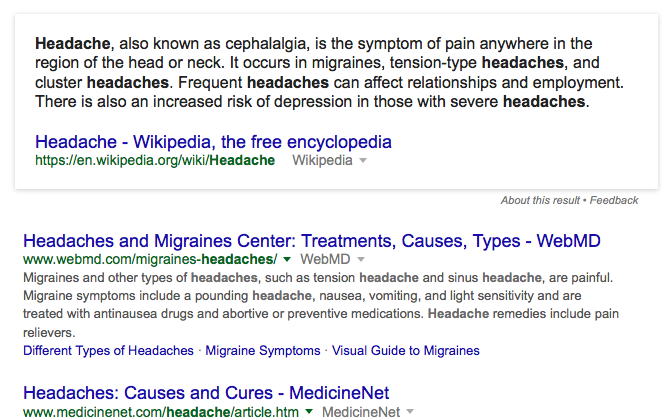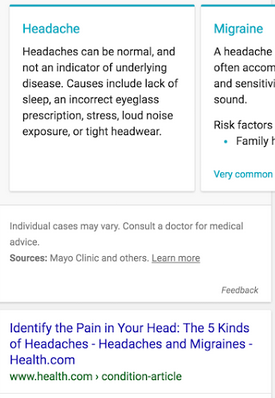Because turning to Google to self-diagnose ailments like a headache is so common, it released new, more medically accurate features to aid you in your quest for medical answers and treatment on the internet (sounds silly when you put it that way, right?). Google now wants to be much more scientific, so that “terminal illness” isn’t the inevitable conclusion when you are Googling headache symptoms.
Front Page News:
Google is embracing its role as diagnosis agent for your medical symptoms and improving what you see when you type in terms like “knee pain” or “indigestion.” In coming days, the internet giant will start to present medical information differently when you Google health conditions. Now, when you Google a term like “headache” – this is what you see:

After ten minutes of research from here, you find yourself in the deep crevices of the internet, experiencing a panic attack because you read that your symptoms might indicate a small brain tumor. No, you aren’t the only one who does this! Turns out, according to Google, roughly 1% of searches of the nearly trillion searches on Google – or millions of searches – are symptom-related. And the search results are often inaccurate or misinterpreted. According to a study at Harvard Medical School, online symptom checkers, such as WebMD and MayoClinic, gave correct diagnoses only 34% of the time.
As such, Google has wisely decided to refine its approach when it comes to search results for health symptoms. Using data from its Google Knowledge Graph along WITH the help of experts at Harvard Medical School and Mayo Clinic, searches will now factor in trained medical opinion to improve what you see when it comes to searching for health conditions.
So in the coming days, a search for the same term “headache” will yield this:

Now you will see a list of related conditions (‘headache,’ ‘migraine,’ ‘tension headache,’ ‘cluster headache,’ ‘sinusitis,’ and ‘common cold’) and an overview description along with information on self-treatment options and what might warrant a doctor’s visit, according to leading physicians (and not the internet).
Read between the headlines:
Google, while it remains a search company that delivers search results driven by over 200 factors, also knows that users rely on the accuracy of its information to drive important decisions, particularly related to health. All search results are only for informational purposes, Google indicates, but we all know that is not how we actually USE Google especially for symptom-related searches. Health conditions are among the most frequently searched topics on Google. One in 20 Google searches is health related. One in five health searches is symptom related, according to USA Today. So by doing this, Google hopes
“…to help you to navigate and explore health conditions related to your symptoms, and quickly get to the point where you can do more in-depth research on the web or talk to a health professional.”- Google blog post
What’s next:
Look for these new features to roll out on the web and on mobile in coming days and in English to start. A roll out internationally and to cover more symptoms is in the works too. Expect traffic to sites like WebMD and MayoClinic.org to possibly decline as the headline results get more accurate. But if you’re a hypochondriac like me, you’ll find your way to the dark side of the medical internet world some way or the other!
Featured image source: longevitynetwork.org